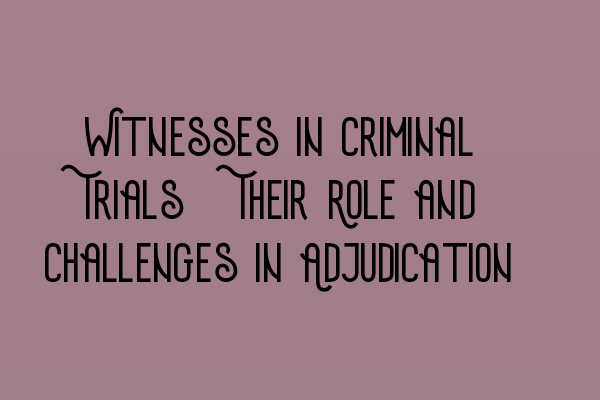Witnesses in Criminal Trials: Their Role and Challenges in Adjudication
In any criminal trial, witnesses play a crucial role in the adjudication process. Their testimonies provide valuable evidence that helps establish the truth and determine the guilt or innocence of the accused. However, being a witness in a criminal trial can be a challenging experience, both personally and legally. In this article, we will explore the role of witnesses in criminal trials, the challenges they face, and how their testimonies are evaluated by the court.
The Role of Witnesses in Criminal Trials
Witnesses are individuals who have firsthand knowledge of the events related to the criminal offense under investigation. They may be victims, bystanders, or individuals who have information relevant to the case. The main role of a witness is to provide a factual account of what they saw, heard, or otherwise experienced.
During a criminal trial, witnesses are called to give their testimonies under oath. This means that they are legally obligated to tell the truth, and lying under oath can result in serious consequences, including perjury charges.
Challenges Faced by Witnesses
Being a witness in a criminal trial can be an intimidating experience. Witnesses may face various challenges that can impact their ability or willingness to provide accurate and reliable testimonies. Some common challenges include:
- Fear and Intimidation: Witnesses may fear retaliation or intimidation by the accused or their associates. This fear can affect their willingness to testify or their ability to recall details accurately.
- Memory Issues: The passage of time or traumatic events can affect the memory of witnesses. They may struggle to remember specific details, leading to inconsistencies or gaps in their testimonies.
- Stress and Anxiety: The courtroom environment, the pressure of cross-examination, and the emotional weight of the trial can increase stress and anxiety for witnesses. This can impair their ability to respond effectively to questions or communicate their experiences clearly.
- Conflicting Interests: In some cases, witnesses may have their own interests or biases that influence their testimonies. They may have personal relationships with the accused, hold grudges, or have motives to protect themselves or others.
Evaluating Witness Testimonies
The court considers various factors when evaluating witness testimonies. The credibility and reliability of witnesses play a crucial role in determining the weight given to their accounts. The following factors are typically considered:
- Consistency: The court examines whether the witness’s testimony is consistent and coherent throughout the trial. Inconsistencies or contradictions may raise doubts about the witness’s credibility.
- Corroboration: The court looks for corroborating evidence that supports or confirms the witness’s testimony. Corroboration can strengthen the credibility of the witness and the overall case.
- Demeanor: The court pays attention to the demeanor of the witnesses during their testimony. Factors such as body language, tone of voice, and composure can affect the perception of their credibility.
- Prior Statements: Any prior inconsistent statements made by a witness can be used to challenge their credibility. The court evaluates whether the inconsistency was due to genuine mistake or deliberate falsehood.
It is important for witnesses to be prepared for cross-examination. Lawyers representing the accused may attempt to discredit witnesses by challenging their credibility or introducing inconsistencies in their testimonies. Therefore, witnesses should be truthful, confident, and ready to withstand rigorous questioning.
Conclusion
Witnesses play a crucial role in criminal trials by providing firsthand accounts of the events under investigation. Despite the challenges they may face, witnesses are essential in the pursuit of justice. Understanding their role and the challenges they encounter allows for a fair evaluation of their testimonies. By considering factors such as consistency, corroboration, demeanor, and prior statements, the court can make informed decisions based on the weight and credibility of witnesses’ accounts.
For aspiring solicitors, understanding the legal intricacies of criminal trials, including witness examination and evaluation, is crucial for success in the SQE exam. To prepare for the exam, check out our related article on SQE Exam Prep: Essential Study Materials for Aspiring Solicitors. You may also find our article on Demystifying the Solicitors Qualifying Examination Format helpful in your preparations.
